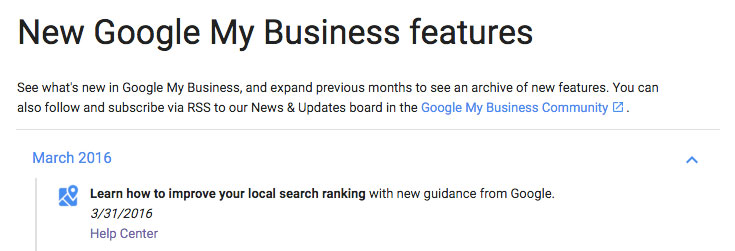Google Updates Local SEO Guidelines, Ranking Factors
On the heels of Google’s big reveal of their top two ranking factors comes still more direction and ranking factor-information—this time specifically for local SEO efforts.
Google recently hinted at “new guidance” for improving local search rankings. In fact, this new information triples what Google previously provided on local SEO ranking factors.

Google’s newly expanded guide to improving local rankings now details three local SEO ranking factors, and provides new information on how to improve your business’s chances of appearing in the coveted Top Three mobile search spots.
Why Local SEO?
But SMB marketers (and owners), are constantly organizing and reorganizing precious marketing resources, so is local SEO really a priority?
Remember that mobile internet usage overtook desktop years ago, and the gap continues to widen. More mobile usage naturally up the ante for local SEO:
- 50% of users who conduct a local search on a smartphone (and 35% who do so on a table or desktop computer) visit a store the same day.
- 50% of mobile users prefer a mobile browser over your app.
- 18% of local searches on a smartphone lead to a purchase the same day (compared to 7% of non-local searches).
Local SEO targets the consumer who is most likely to buy, and ready to pull the trigger. If your business could benefit from smoking-hot leads, local SEO should get a seat at the marketing table.
3 Local SEO Ranking Factors
We knew these already, but Google has provided some extra details:
Relevance
Relevance refers to how well a local listing matches what someone is searching for.
Distance
How far is each potential search result from the location term used in a search? If a user doesn’t specify a location in their (sic) search, Google will calculate distance based on what’s known about their (sic) location.
Prominence
Prominence refers to how well-known a business is. Some places are more prominent in the offline world, and search results try to reflect this in local ranking.
Prominence is also based on information that Google has about a business from across the web (like links, articles, and directories). Google review count and score are factored into local search ranking: more reviews and positive ratings will probably improve a business’s local ranking. Your position in web results is also a factor, so SEO best practices also apply to local search optimization.
Most of that information can be fed to Google, but the information on how Google determines “prominence” is especially interesting.
Google collects information from all over the web to determine how important your business actually is in the real world—one more reason to set up your business’ name in Google Alerts and/or Social Mention. Make sure you know what is being said about your brand.
Optimize Google My Business for Local SEO Results
Google My Business is how you feed some of the information that Google is looking for, directly to the search engine. The new, expanded recommendations include:
- Enter complete data—Complete business entries are easier to match for relevance. FIll out as much of the information as you can, and be sure to keep it updated.
- Verify your location(s)—The #1 piece of information sought by local searches is location/address. Google wants to deliver close results, and users want to find you easily. Make sure your location info is complete.
- Keep your hours accurate—If users are traveling, they’re more likely to go to a business they know is open, rather than one with no hours posted. Make a special note to keep this updated during holiday seasons.
- Manage and respond to reviews—88% of consumers trust local reviews as much as personal recommendations. Engage with your customers by responding to reviews.
- Add photos—They’re worth 1000 words, right? Include the outside of the building to help consumers find you, and your most popular products/dishes/etc.
Filling in and maintaining this information is not a huge task, and the ROI is great. A lot of SEO is a long-term strategy of building trust, but here, Google is asking you for information to deliver directly to users. No marketer can pass that up.
Improve Your Local SEO Today
There is a lot that any SMB marketer can do to jumpstart local SEO efforts in light of this new information from Google. Of course, the weightier factors are going to be overall SEO and customer reviews—both of which your business will have to earn over time—but now we know what Google is actually looking for.
Start by checking in with Google My Business to fill in any holes. As you update and maintain your local SEO strategy, make sure to check on it primarily from your smartphone since that’s where local search usually happens.
As mobile continues to grow, local SEO will continue to get more and more important for brick-and-mortar businesses. Get your business started now so you’re not scrambling to catch up in a few more months.
What's Next?
Profound Strategy is on a mission to help growth-minded marketers turn SEO back into a source of predictable, reliable, scalable business results.
Start winning in organic search and turn SEO into your most efficient marketing channel. Subscribe to updates and join the 6,000+ marketing executives and founders that are changing the way they do SEO:
And dig deeper with some of our best content, such as The CMO’s Guide to Modern SEO, Technical SEO: A Decision Maker’s Guide, and A Modern Framework for SEO Work that Matters.




